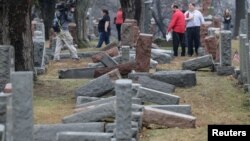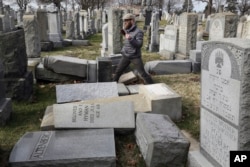“I’ve been doing this work for 20 years, and we’ve never seen anything like that many bomb threats in a row,” Mark Potok, senior fellow at the Southern Poverty Law Center told VOA recently, referring to a string of some 100 threats made to Jewish organizations since January.
At least three Jewish cemeteries were attacked in the past two weeks, in St. Louis, Missouri; Philadelphia, Pennsylvania; and Rochester, New York, in a case discovered March 3. In all cases, headstones of Jewish graves were knocked over or defaced. Hundreds of headstones were damaged, including some dating back to the 1800s.
On Friday, the Federal Bureau of Investigation arrested Juan Thompson, 31, on suspicion of making bomb threats to several Jewish community centers as well as the New York-based Anti-Defamation League, an advocacy organization that tracks anti-Semitic attacks. The ADL evacuated its offices in New York February 22 and in San Francisco February 27 because of bomb threats.
Also Friday, FBI officials met with members of the Jewish community in New York to discuss the anti-Semitic threats. The group of Jewish organizations in attendance released a statement thanking the FBI for its “extraordinary effort” investigating the threats.
Trump speaks out
President Donald Trump began his first speech to Congress Tuesday with a rare reference to the crisis.
“Recent threats against Jewish community centers and vandalism of Jewish cemeteries, as well as last week’s shooting in Kansas City, remind us that while we may be a nation divided on policies, we are a country that stands united in condemning hate and evil in all of its very ugly forms,” Trump said.
Trump then moved on to other topics. Critics said he should have spent more time on the issue and laid out an action plan to discourage further threats.
The Trump administration drew criticism in January for a Holocaust remembrance statement that failed to make specific mention of Jews. Instead, it commemorated the “victims, survivors, heroes” of the Holocaust.
White House spokeswoman Hope Hicks later explained to CNN, “We took into account all of those who suffered,” political prisoners, homosexuals, gypsies, Poles, disabled people, and many others as well as Jews.
Pence tours former concentration camp
While Trump, whose daughter and son-in-law are Jewish, has said little about the threats and attacks, Vice President Mike Pence made two high-profile appearances last month in support of the Jewish community.
On February 19 while on a visit to Germany, Pence toured the former Nazi concentration camp at Dachau. A few days later, he visited the St. Louis cemetery in the United States where nearly 200 Jewish gravestones were vandalized.
In a speech in Washington, Trump called the St. Louis attack “a horrible and painful act.” Pence echoed that, calling the vandalism “vile.” He said the administration condemns it in the strongest terms. He praised the people of St. Louis for rallying around the Jewish community after the attack.
“There is no place in America for hatred, prejudice, or acts of violence, or anti-Semitism,” Pence said.
Public figures called to do more
Professor Steven Goldstein, national director of the Anne Frank Center for Mutual Respect, told VOA Trump should focus on the threats with a televised speech centered on hate crimes.
“The president should give a prime-time, televised address outlining specifically what he will do to combat not just anti-Semitism, but all forms of hatred, including Islamophobia, racism, anti-Mexican sentiment, sexism, anti-LGBT (lesbian, gay, bisexual, and transsexual) bias, and prejudice against the differently abled,” he said.
Goldstein said public figures have an influence on other people’s behavior and a responsibility to set a good example.
“When we turn away from calling out hate,” he said, “and when we deny or refuse, as Donald Trump did, refuse to include Jews in his Holocaust remembrance statement a few weeks ago, and dug in his heels when we pointed it out, that helps create an incubator of hate in America.”
“Unless our leaders speak out for justice,” he said, “there will be some elements in this country that will take [the lack of official comment] as a permission to do the very worst that human impulse can do.”
Potok of the Southern Poverty Law Center agreed, noting that President George Bush handled anti-Muslim attitudes very differently after the September 11, 2001 attacks on the United States.
“Immediately after 9/11 in late 2001, President Bush repeatedly made the statement that Arabs are not our enemy, Muslims are not our enemy,” Potok said. “He also did symbolic things like stand in the National Cathedral with an imam.”
Potok pointed out that anti-Muslim hate crimes fell dramatically the following year, from 481 in 2001, to just 155 in 2002.
On February 27 the Anti-Defamation League released a suggested action plan for the Trump administration to bolster its position on hate crimes. The plan calls for a federal interagency task force on fighting hate crimes, a president-appointed White House coordinator for fighting hate crimes, and presidential support for federal and state funding designed to protect students from discrimination on college campuses and in public schools.
Perhaps most notable, however, is the plan’s final point, in the words of ADL national director Jonathan Greenblatt: “The president and his Cabinet must make the point to call out bigotry at every opportunity. ... All our leaders must call out hate whenever and wherever it appears.”
















